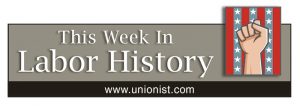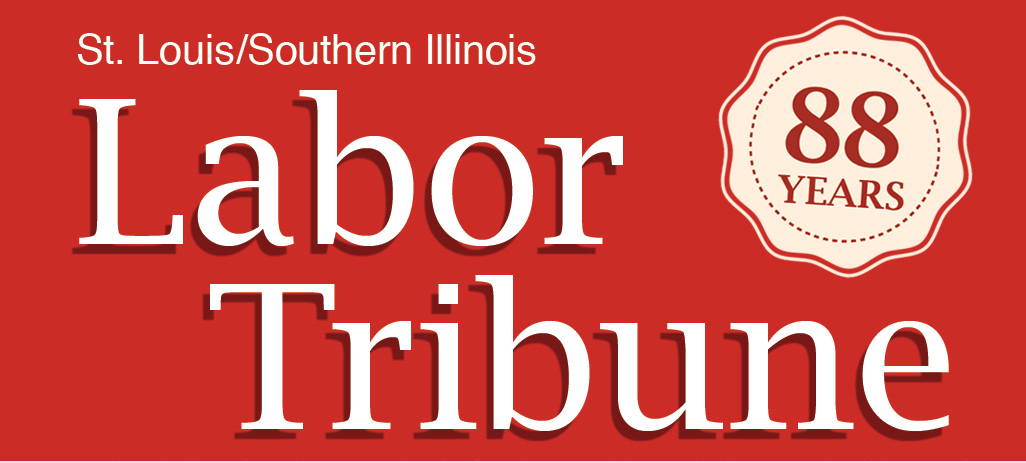This Week in Labor History May 13-19

MAY 13
1893 – Western Federation of Miners formed in Butte, Mont.
1909 – The Canadian government establishes the Department of Labour. It took the U.S. another four years.
1980 – UAW President Douglas A. Fraser is named to the Chrysler Corp. board of directors, becoming the first union representative ever to sit on the board of a major U.S. corporation.
1998 – Thousands of yellow cab drivers in New York City go on a one-day strike in protest of proposed new regulations.
MAY 14
1953 – Milwaukee brewery workers begin 10-week strike, demanding contracts comparable to East and West Coast workers.
MAY 15
1891 – Pope Leo XIII issues revolutionary encyclical “Rerum novarum” in defense of workers and the right to organize.
1906 – U.S. Supreme Court rules in favor of Samuel Gompers and other union leaders for supporting a boycott at the Buck Stove and Range Co. in St. Louis, where workers were striking for a nine-hour day.
1917 – The Library Employees’ Union is founded in New York City, the first union of public library workers in the United States. A major focus of the union was the inferior status of women library workers and their low salaries.
1920 – The first Labor bank opens in Washington, D.C., launched by officers of the Machinists.
MAY 16
1934 – Minneapolis general strike backs Teamsters, who are striking most of the city’s trucking companies.
1938 – U.S. Supreme Court issues Mackay decision, which permits the permanent replacement of striking workers.
1979 – Black Labor leader and peace activist A. Philip Randolph dies.
MAY 17
1954 – Supreme Court outlaws segregation in public schools.
2004 – Twelve Starbucks baristas in a midtown Manhattan store, declaring they couldn’t live on $7.75 an hour, signed cards demanding representation by the Industrial Workers of the World, or Wobblies.
MAY 18
1912 – In what may have been baseball’s first Labor strike, the Detroit Tigers refuse to play after team leader Ty Cobb is suspended: he went into the stands and beat a fan who had been heckling him.
1917 – Amalgamated Meat Cutters union organizers launch a campaign in the nation’s packinghouses, an effort that was to bring representation to 100,000 workers over the following two years.
1919 – Jerry Wurf, who was to serve as president of the American Federation of State, County and Municipal Employees (AFSCME) from 1964 to his death in 1981, born in New York City. The union grew from about 220,000 members to more than one million during his presidency.
1928 – Big Bill Haywood, a founding member and leader of the Industrial Workers of the World (the Wobblies), dies in exile in the Soviet Union.
1950 – Atlanta transit workers, objecting to a new city requirement that they be fingerprinted as part of the employment process, go on strike. They relented and returned to work six months later.
1979 – Oklahoma jury finds for the estate of atomic worker Karen Silkwood, orders Kerr-McGee Nuclear Co. to pay $505,000 in actual damages, $10 million in punitive damages for negligence leading to Silkwood’s plutonium contamination.
MAY 19
1902 – Two hundred sixteen miners die from an explosion and its aftermath at the Fraterville Mine in Anderson County, Tenn.
1920 – Shootout in Matewan, W. Va., between striking union miners (led by Police Chief Sid Hatfield) and coal company agents. Ten died, including seven agents.
1942 – The Steel Workers Organizing Committee, formed by the Congress of Industrial Organizations, formally becomes the United Steelworkers of America.
1950 – A total of 31 dockworkers are killed, 350 workers and others are injured when four barges carrying 467 tons of ammunition blow up at South Amboy, N.J.
(Compiled by David Prosten, founder Union Communication Services)



Leave a Reply